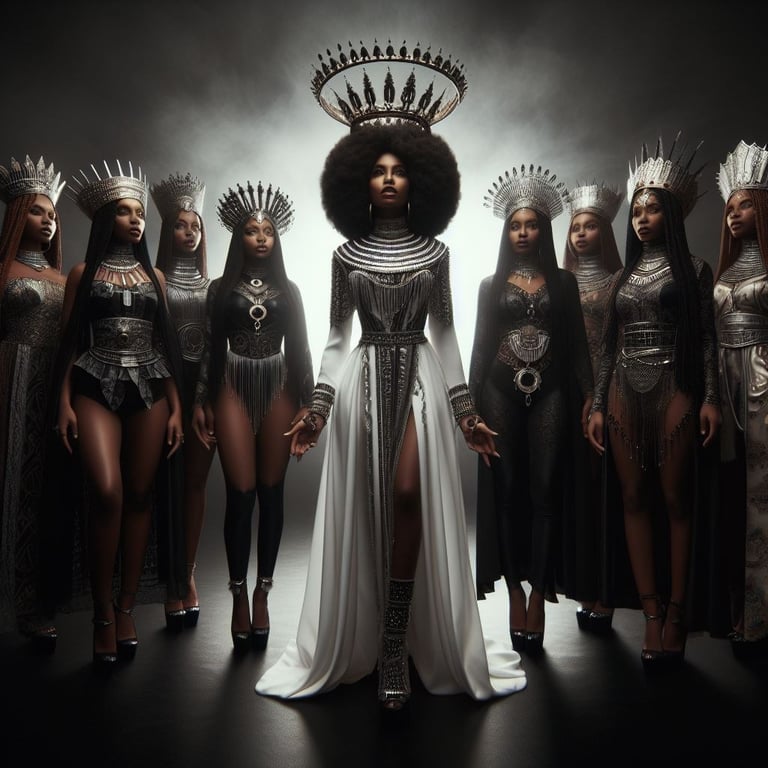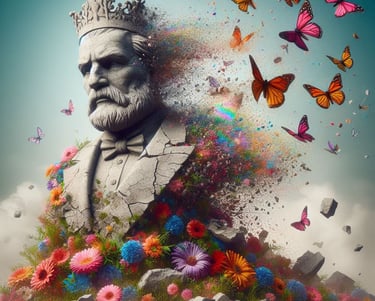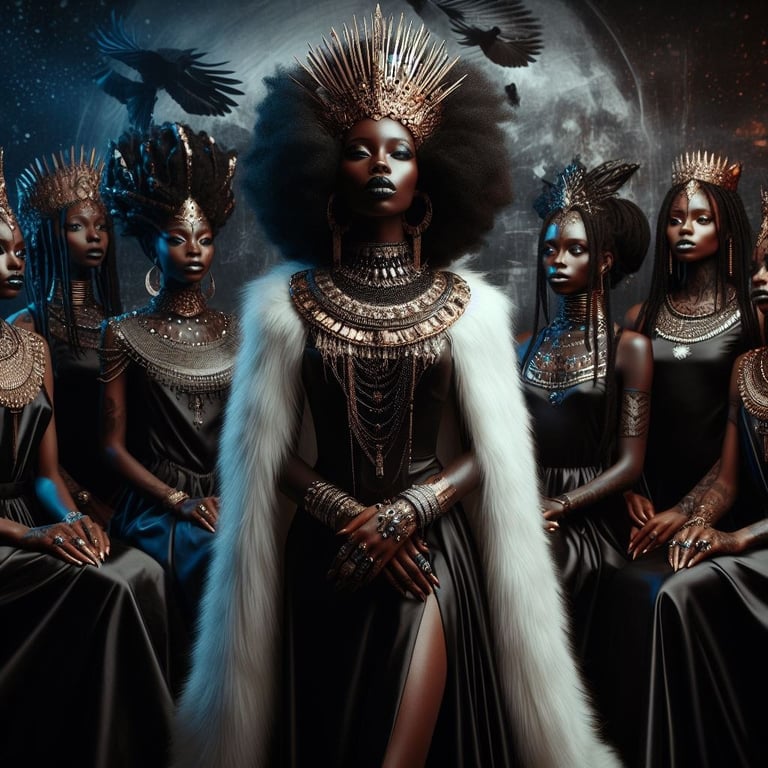The Rise of Matriarchy: Beyond Feminism and Towards a World Led by Women
Join me on a whimsical journey through the lands of matriarchy, armed with humor, facts, and a dash of sass. Delve into the contrasting worlds of matriarchy and feminism, exploring historical legacies, present-day triumphs, and reflections in nature. Buckle up for a revolutionary ride towards a brighter, more equitable future – because in the matriarchy, we trust! 🌸👑 #MatriarchyRevolution
THE TRUTH TOLD BLOG
Queen Tasha
3/31/20247 min read


Intro
In a world where the echoes of patriarchy have long dominated the discourse, and debates over gender equality and women's rights continue to rage, the notion of a matriarchy may seem like a radical concept that sends chills down the spines of traditionalists and raises eyebrows among skeptics. But fear not, fellow earthlings, for today we embark on a whimsical journey through the lands of matriarchy, armed with humor, facts, and a dash of sass. Buckle up, because we're about to embark on a journey through the realms of matriarchy, feminist mindsets, and the profound impact they have on our planet.
Unveiling Matriarchy vs. Feminist Mindset
First things first, let's clear the air about what a matriarchy truly entails. Advocating for a matriarchy doesn't mean we're plotting to banish all men to some remote island (though I'm sure they'd enjoy that, wouldn't they?) Matriarchy does not mean the oppression of men. A matriarchy isn't just about women holding the reins of power; it's a socio-political system where women, as a collective, are at the forefront of decision-making, governance, and societal structures. It's about embracing feminine values such as empathy, collaboration, and nurturing, and integrating them into the very fabric of our communities. And frankly, it's about time. I mean, have you seen some of the messes men have gotten us into? From wars to environmental destruction, it's clear that maybe, just maybe, a little feminine energy could do us all some good.
On the other hand, the feminist mindset, while undeniably crucial in challenging the status quo, often finds itself entangled within the confines of the patriarchal system it seeks to dismantle. Striving for equal rights within an inherently unequal system can sometimes perpetuate the cycle of oppression, rather than truly emancipating individuals from its grip.
But why settle for equality within a broken system when you can flip the script entirely? That's where feminism often falls short. Don't get me wrong; I admire the tireless efforts of feminists in dismantling the patriarchy piece by piece. But it's like trying to fix a sinking ship with duct tape – you're just prolonging the inevitable. Matriarchy, on the other hand, says, "Screw the ship; let's build a submarine." It's bold, it's audacious, and it's exactly what the world needs right now.
A Brief History of Matriarchy
But I digress. Let's talk history. Throughout most of recorded history, we've been living in a patriarchy. You know, the whole men-at-the-top, women-in-the-kitchen shit. The history books might have you believe that patriarchy is the natural order of things, but let's not forget the countless matriarchal societies that thrived across the globe long before the rise of male-dominated structures. From the Amazons of Greek mythology to the Dahomey Kingdom in West Africa, from the matrilineal tribes of Africa and indigenous communities of North America. Or the Khasi tribe in India, where property and lineage are passed down through the maternal line.
Take, for example, look to Africa, where queens once ruled with authority and dignity. The Igbo people of Nigeria, where women held positions of power in both politics and economics. The Ashanti Empire in West Africa, where Queen Mothers held significant political power and played pivotal roles in governance and decision-making. Queen Nzinga of Ndongo and Matamba, who defied colonial powers and fought for her people's freedom. Or Queen Amina of Zazzau, whose military prowess struck fear into the hearts of her enemies. These women weren't waiting for a man to lead – they grabbed the reins and forged their own destinies. Matriarchy has left its indelible mark on human civilization, and let me tell you, these ladies knew how to rule with an iron fist. Their leadership wasn't just about authority but was deeply rooted in communal welfare and harmony—an ethos sorely lacking in many patriarchal systems.
Present-Day Triumphs of Matriarchy
Contrary to popular belief, matriarchal societies aren't just relics of the past; they're alive and thriving in the present day. Look no further than the Mosuo community in China, where women are the heads of households and hold key positions in the socio-economic structure. In Mosuo society, inheritance passes through the maternal line, and decisions are made through consensus-building—a stark departure from the hierarchical norms of patriarchy. And let's not forget the present-day success stories, like the Scandinavian countries, where gender equality isn't just a pipe dream – it's a way of life.
But fear not, fellow matriarchs-in-training, for the tide is turning. With each passing day, more and more people are waking up to the possibilities of a world where women are valued and respected as equals. And it's not just wishful thinking; it's backed by cold, hard facts. Studies have shown that companies with more women in leadership positions tend to be more profitable and innovative, while countries with greater gender equality have higher levels of happiness and well-being among their citizens. It's a win-win situation, folks.
Family Practices and Benefits of Matriarchy
In matriarchal societies, family structures are often centered around cooperation and mutual support rather than hierarchy and domination. Women are revered as life-givers and nurturers, and their wisdom guides the upbringing of future generations. This emphasis on empathy and emotional intelligence fosters stronger familial bonds and lays the groundwork for a more compassionate society.
But it’s not just about who’s sitting on the throne—it’s about how matriarchal societies operate on a day-to-day basis. Picture a world where childcare isn’t just a woman’s responsibility, but a communal effort where everyone chips in. Imagine a society where empathy and compassion are valued just as much as strength and assertiveness. Sounds like a pretty sweet deal, doesn’t it? It's like a well-oiled machine where everyone has a role to play, and no one is left behind.
Moreover, research has shown that matriarchal societies tend to be more egalitarian, with greater gender parity in both private and public spheres. This isn't just beneficial for women but for society as a whole, as diverse perspectives lead to more innovative solutions to complex problems. Plus, children raised in matriarchal households tend to be more emotionally intelligent, resilient, and empathetic. So, it's not just good for women – it's good for everyone.
Reflections of Matriarchy in Nature
When we gaze into the wild and untamed world of nature, we witness a tapestry woven with the threads of matriarchy. It's a realm where the balance of power is not dictated by brute strength or machismo but by the wisdom and resilience of the female of the species.
Take, for instance, the majestic lions prowling the savannahs of Africa. While the image of a fierce, maned king ruling over his pride may dominate our collective imagination, the reality is far more nuanced. In lion society, it's the lionesses who wear the crown – or in this case, the mane. These fierce females are the backbone of the pride, responsible for hunting down prey with surgical precision to ensure the survival of their family unit.
Meanwhile, the male lions? Well, they're more like glorified bodyguards, tasked with defending the pride's territory and mating with the lionesses. It's a stark contrast to the patriarchal narratives we've been fed for centuries, where strength and dominance are synonymous with leadership. In lion society, it's the females who call the shots, proving once and for all that leadership knows no gender.
But it's not just the big cats who embrace matriarchy; even the humble honeybee bows to the queen. In a bustling hive, the queen bee reigns supreme, her pheromones dictating the ebb and flow of life within the colony. She's the ultimate decision-maker, determining everything from when to lay eggs to which drones are worthy of mating with her. And what about the male drones? Well, their sole purpose in life is to serve the queen – literally. Once they've fulfilled their duty, they're unceremoniously kicked out of the hive to fend for themselves.
It's a system that may seem harsh to human eyes, but in the world of bees, it's a testament to the power and influence of matriarchy. The queen bee ensures the survival of her species by carefully orchestrating the reproductive cycle of the hive, while the drones dutifully follow her lead. It's a stark reminder that in nature, as in life, women are not just capable leaders – they're essential for the sustainability of the species.
The Rise of Matriarchy: A Beacon of Hope
As we stand on the precipice of unprecedented global challenges—from climate change to socio-economic inequality—the need for a paradigm shift has never been more pressing. The patriarchal system has proven itself unsustainable, perpetuating inequality, exploitation, and ecological devastation.
In this critical juncture, the resurgence of matriarchy isn't just desirable; it's imperative. Drawing inspiration from the rich tapestry of matriarchal traditions—from the Amazons of Dahomey to the Maasai matriarchs of East Africa—we can forge a new path forward, one guided by empathy, cooperation, and respect for all life forms. Next time you find yourself pondering the possibilities of a matriarchal society, remember this: it's not just a fanciful notion but a beacon of hope in a world desperately in need of change.
So, what's the moral of this whimsical tale? In a world teetering on the brink of collapse, where climate change, political instability, and social unrest threaten our very existence, the time for matriarchy is now. It's not just a movement – it's a revolution, a seismic shift in the way we perceive power, leadership, and gender roles. And as we stand on the precipice of change, let's remember the words of Maya Angelou: "Each time a woman stands up for herself, she stands up for all women." So, let's stand up, sisters, and lead the charge towards a brighter, more equitable future – one where women lead, men protect, and together, we build a world worthy of future generations.
"In the Matriarchy We Trust!" Cheers to that!












Mailing Address
690 Main St. PMB 10023
Safety Harbor, FL 34695
Subscribe to Newsletter
Contacts
QueenTashasEmpire@gmail.com
